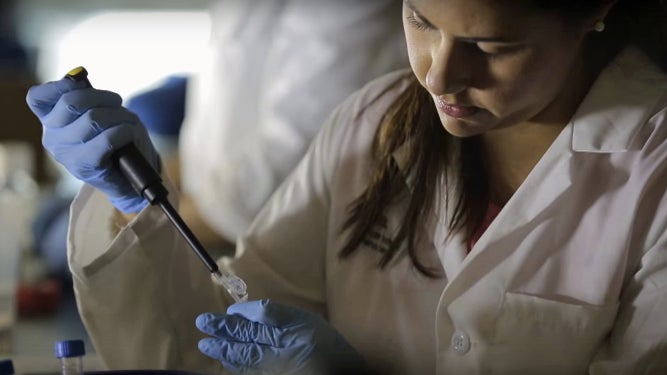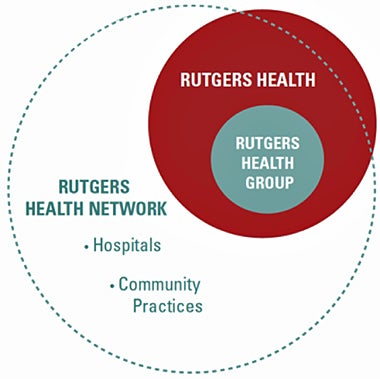Explainer: How Rutgers plans to become a health care powerhouse

(Image from Rutgers University's promotional video for Rutgers Health)
What it is:
Rutgers Health is a new brand for the university that will unify all of the patient-focused parts of its medical practices, clinics, and schools into a single entity.
 Within Rutgers Health are Rutgers Health Group, a new nonprofit corporation that will be developed as a statewide faculty practice consisting of more than 1,000 Rutgers-based physicians, dentists, psychologists, nurses, pharmacists, and other clinicians who will comply with university policies and standards of care, It will also include Rutgers Health Network, a new partnership that will likely be developed between Rutgers and its affiliated teaching hospitals and ancillary patient healthcare locations like wellness and community centers.
Within Rutgers Health are Rutgers Health Group, a new nonprofit corporation that will be developed as a statewide faculty practice consisting of more than 1,000 Rutgers-based physicians, dentists, psychologists, nurses, pharmacists, and other clinicians who will comply with university policies and standards of care, It will also include Rutgers Health Network, a new partnership that will likely be developed between Rutgers and its affiliated teaching hospitals and ancillary patient healthcare locations like wellness and community centers.
Rutgers will form the largest academic healthcare provider organization in the state, and according to a statement from President Robert Barchi, “Rutgers Health will become one of the first academic healthcare-provider organizations in the nation to integrate a full range of health-related specialties — including medicine, dentistry, pharmacy, nursing, and clinical psychology — in addition to more traditional fields, such as neurology, surgery, cardiology, and oncology.”
Who’s part of it:
Rutgers Health includes the clinical components of 12 Rutgers healthcare schools.
Ernest Mario School of Pharmacy
Graduate School of Applied and Professional Psychology
New Jersey Medical School
Robert Wood Johnson Medical School
Rutgers Cancer Institute of New Jersey, New Jersey’s only NCI-designated Comprehensive Cancer Center and a leader in patient care and cancer research
Rutgers School of Dental Medicine
School of Health Related Professions
School of Nursing (Newark and New Brunswick)
School of Nursing-Camden
School of Social Work
University Behavioral Health Care
Health services for Rutgers students
It is anticipated that the group will embrace more than 1,000 healthcare professionals who teach at Rutgers and participate in faculty practices. The network is expected to include hospital partners, among them the university’s teaching hospitals (notably University Hospital in Newark and Robert Wood Johnson University Hospital-Barnabas in New Brunswick), outpatient clinics, and wellness centers. It will not actively attempt to reach into South Jersey, since Rutgers doesn’t want to compete against its health-sciences partner in that region, Cooper University Health Care, which is affiliated with Rowan University.
Why Now:
As part of the New Jersey Medical and Health Sciences Restructuring Act of 2012, Rutgers acquired most of the legacy parts of the University of Medicine and Dentistry of New Jersey, which lawmakers disbanded in the act. To organize these and other (current and future) health sciences programs, the university created the Rutgers Biomedical and Health Sciences college and hired internist Brian Strom as chancellor and executive vice president for health affairs. Now charged with managing two medical schools in New Brunswick and Newark along with myriad related programs and facilities, the school’s board of governors believed it was time to better organize and consistently brand the university’s offerings. As part of his chancellor duties, Strom will lead Rutgers Health.
“We want to be sure there’s a consistency and single high level of quality for all of our care,” said Strom, who acknowledged that the branding will also make Rutgers’ medical presence more competitive. “We have lots and lots of separate units. This will unify them so people will get a sense for how big we are all over the state.”
Goals of Rutgers Health:
In announcing the initiative, Barchi pointed to a changing service-delivery landscape that favors a value-driven model over the traditional fee-for-service system. The federal government is pushing for more providers to share information about their fees with one another and the public so that patients can select those they believe offer the best financial value. In keeping with the times, Strom says a coordinated system will allow managers to hire lower-cost professionals like nurse practitioners and nurses where they’re needed instead of more expensive MDs. A single network also allows Rutgers to set consistent policies across all of its offices. For instance, Rutgers Health could specify whether all nurses need to get flu shots; under the current system, each practice makes its own determinations.
Eventually, the offices and departments will be able to share patient information to streamline billing and appointments and encourage multiple clinicians to work together. “That is clearly where we’re heading – integrated holistic systems,” Strom said.
Timeline:
The data-sharing phase of development is likely years away, and Strom says it’s too early to estimate a timeline for many Rutgers Health initiatives. He hopes to launch a hotline and a redesigned website within a month where patients can get information about participating specialists. Next year will bring an advertising campaign. Anything after that will depend on how things are progressing.
Cost:
Strom says short-term costs are “pretty modest,” and primarily involve hiring some consultants and senior staff. He expects that bringing so many people together will result in efficiencies of scale and better bargaining power with suppliers.
WHYY is your source for fact-based, in-depth journalism and information. As a nonprofit organization, we rely on financial support from readers like you. Please give today.




